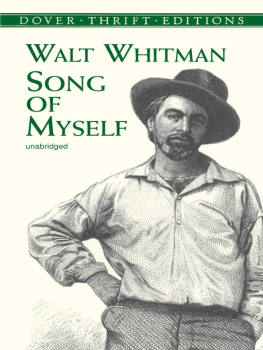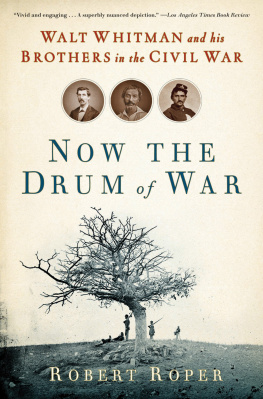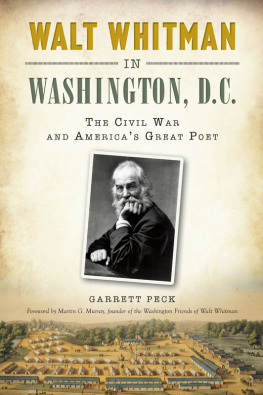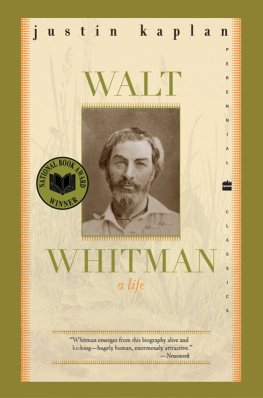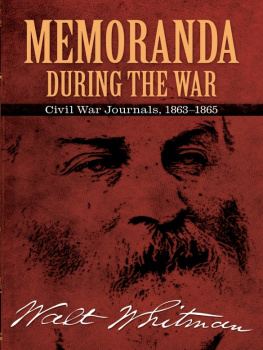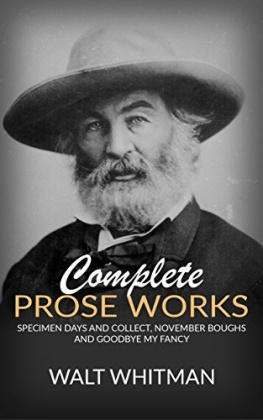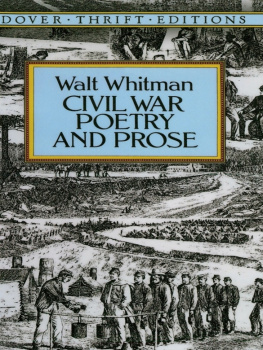Table of Contents
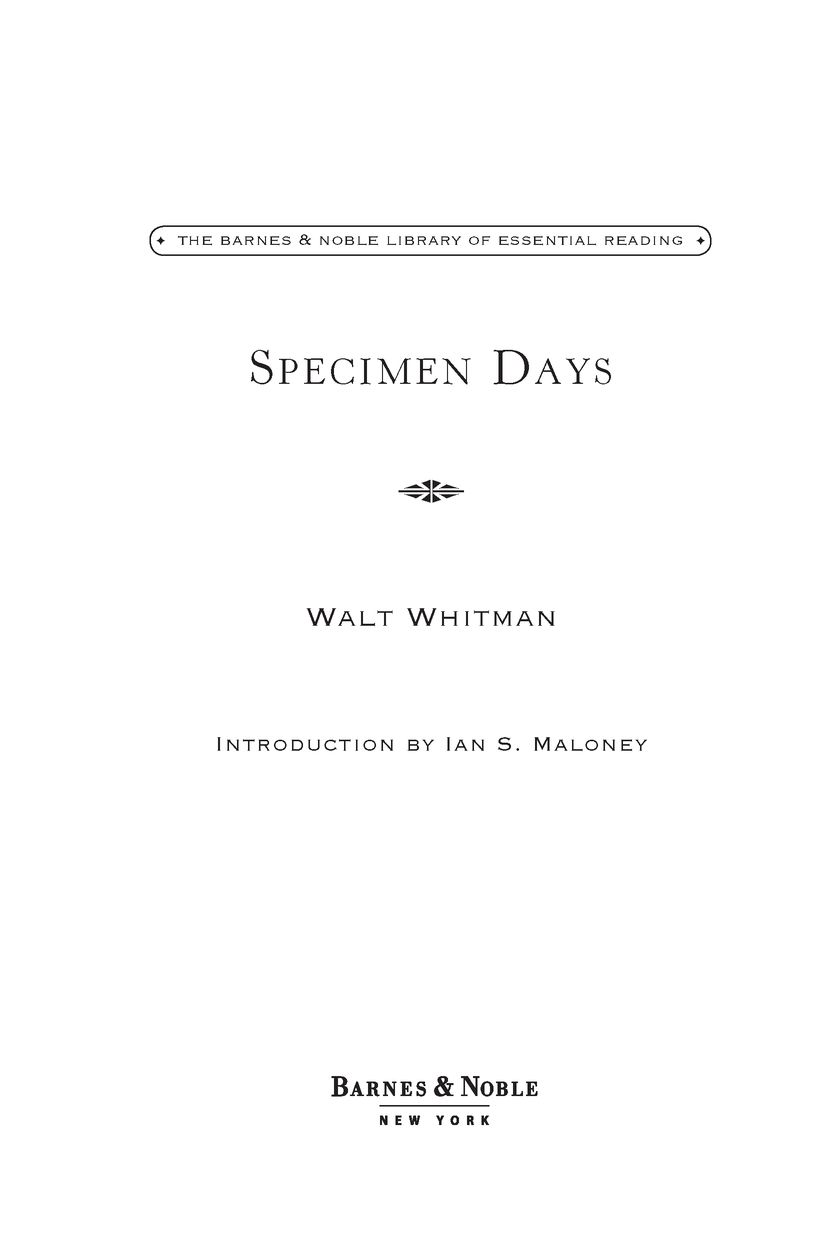
INTRODUCTION
WALT WHITMANS SPECIMEN DAYS, PUBLISHED IN 1882, PROVIDES AN extraordinary picture of an aging poet reassessing the path of his long life, one intrinsically linked with the trajectoryand traumasof the nation he cherished so deeply. The book, with its diary-like entries, is a prose compilation of a life lived richly and in the service of others, as well as an enduring portrait of a monumental writer. Whitman collected these fragments and observations throughout his life and began to put them into a volume in 1881, perhaps spurred on by Richard Maurice Bucke, who was then writing a biography of Whitman. Specimen Days reveals the remarkable course of Whitmans life and accomplishments, starting with his boyhood spent roaming the coast of Long Island, to his days as a writer and observer of the cities of New York and Brooklyn, to his volunteer work as a Washington field nurse during the Civil War, and finally to his serene nature writings and travel diaries as an older man. Whitmans book of memories resounds with striking sections on war, nature, people, and travel. Composed by arguably the finest and most original of American poets, Specimen Days is an underappreciated autobiographical masterpiece by one of the most important writers of any generation in America.
Walt Whitman was born in West Hills, Long Island, on May 31, 1819. He was the son of a radical freethinking carpenter and a devout homemaker. Walter Whitman, Sr., had socialist leanings and a deep respect for Thomas Paine, author of the Revolutionary War treatise Common Sense (1876) as well as a defense of the Enlightenment principles of freedom and democracy, The Rights of Man (1792). He thereby imbued his son with a profound reverence for the American spirit, particularly its radical strains. Whitman, Sr., had difficulty establishing himself, working first as a builder and land speculator, and then as a farmer. As a result, young Walt spent his early childhood in Brooklyn, where his family seemed to be in a constant state of transition and instability. Walts father imparted to his son a respect for rough, working-class types, while his mother, Louisa Whitman, instilled in her child sensitivity and compassion for others. Throughout his life, Whitman maintained close ties with much of his family, although his relationship with his father was strained at best.
Whitman received little formal education. Most of his learning took place in public libraries and through hands-on experience. Before embarking on his career as a poet, Whitman worked as a schoolteacher, builder, journalist, fiction writer, printer, and editor. As a teacher, Whitman was noted by pupils and parents for his abhorrence of corporal punishment. He employed a conversational pedagogical style, bucking the prevalent method of rote memorization and regurgitation of facts.
Whitmans first long piece of writing was a temperance novel titled Franklin Evans; Or the Inebriate: A Tale of the Times, which was published in 1842 and sold well, even though Whitman thought it to be rot. The book was geared toward a popular audience and played off sensational stories of debauchery and dark reform literature that exposed abuses found beneath the surface of society. David S. Reynolds argues that Whitman tended to transform sensational imagery and themes into a purifying, transfiguring poetics throughout the rest of his career. In 1846, Whitman became editor of the Brooklyn Eagle, one of the numerous positions he held in publishing during his life.
Whitmans work in journalism was essential to his personal and professional development. It was during his newspaper days that he experienced the power of technology to enable journalists to inform, educate, inspire, and influence their growing readerships. Whitman began to see himself as a voice for democracy, a prophet who could bring together head, heart, libido, and limbs in a harmonious unison. Working as a journalist enabled Whitman to witness the vast spectrum of American life; he appreciated the dignity of common labor and popular entertainments, as well as the refinements of high culture and classical learning. Whitman channeled all that he saw, read, and experienced into a truly synthetic democratic whole, making room in his poetry and other writings for all of Americaindeed all of humanity.
After a brief stint as a reporter for the New Orleans Crescent in 1848, Whitman returned to Brooklyn to seek the proper written outlet for his thoughts and feelings. In 1855, he found his vehicle in the twelve poems of Leaves of Grass, which became Whitmans lifelong literary adventure into himself, the world, and the complexities of the independent, immortal soul. Leaves of Grass is Whitmans undisputed masterpiece. It went through six editions from the original 1855 edition to the deathbed edition of 1891, which had swelled to nearly four hundred poems.
During the tumultuous years of the Civil War (1861-1865), Whitman linked his poetic development forever with his countrys fortunes. In 1862, Whitman went to Washington, D.C., to care for his brother George, who was superficially wounded in the battle at Fredericksburg. This period of his life altered the course of Whitmans career and provided the backbone for Specimen Days. The Civil War entries of Specimen Days, particularly Whitmans precise notes of wound tending, letter writing, and caregiving, stand as some of the most powerful passages in Civil War literature. Throughout the war, Whitman worked as a government clerk and also volunteered in field hospitals where he tended to the needs of the injured from both the Union and Confederate forces. In 1865, Whitman was fired from his government clerk position by Secretary of the Interior James Harlan, who was outraged at having the indecent writer of Leaves of Grass serving under his supervision. Whitman quickly found a similar position elsewhere.
The strain of service physically and emotionally took its toll on Whitman. Many friends and family members believed his Washington hospital service aged him considerably. The April 1865 assassination of Abraham Lincoln, Whitmans iconic personal hero, upset the poet profoundly but inspired one of the great elegies in American literature, When Lilacs Last in the Dooryard Bloomd. The dark moments of the Civil War tested Whitmans belief in the holiness of the union, but ultimately he heralded its revitalization through armed conflict.
After the Civil War, Whitmans standing as a poet grew, particularly in England thanks to articles and collections of his poems published by William Rossetti. Two early works about Whitman, William OConnors Good Gray Poet (1866) and a first biography by John Burroughs (1867), added to his reputation. Whitman moved back and forth between Washington and Brooklyn after the war, writing new poems and continuing to revise and rework Leaves of Grass. He also read one of his poems, As a Strong Bird on Pinions Free, at the Dartmouth College commencement in June 1872.
In 1873 Whitman endured two major setbacks: he suffered a paralytic stroke in January, and his mother died in May. Whitman subsequently took up permanent residence with his brother in Camden, New Jersey, where he famously spent the rest of his days, buying a house on Mickle Street in 1884, where he welcomed the many pilgrims who came to see the Old Gray Poet. Walt Whitman died in relative poverty on March 26, 1892, and was buried in Harleigh Cemetery in Camden.
What is truly astonishing about Whitmans career is his unlikely ascension into the American literary pantheon. Whitmans life is a rags to riches story for the literary ages: a journeyman writer and editor with only an elementary-school education became the godfather of American poetry. Ezra Pound, while being far removed from Whitman in terms of poetics and cultural attitudes, suggested that Whitman was to the United States what Dante was to Italy. Pound acknowledged Whitman as the first American poet to write in the vernacular of his people and capture the essence of its culture. D. H. Lawrence, among many others, believed Whitman to be the true pioneering voice of America.




